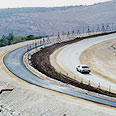
Palestinians: Our lives will become hell
Justice Aharon Barak rejects petition filed by residents of Palestinian village against fence route surrounding Jewish settlements. 'We were not convinced that there is an alternative route which meets security demands, and saw it fit not to interfere in army's decision,' he says
The fence route, 6-kilometers (3.726 miles) long, was built around the village Emanuel, Maale Shmoron and Karnei Shomron, which are located in the West Bank, on lands belonging to Palestinian villages.
According to a court ruling issued by former Supreme Court President Aharon Barak, "The three Jewish communities were targets of harsh terror attacks in recent years, which claimed lives more than once.
"The residents of Emanuel have been forced to deal with shooting attacks against buses more than once. In these terror attacks, 19 people lost their lives and dozens were injured."
The State decided to build the security fence in the area of the aforementioned communities, and part of the fence is to surround the city of Ariel and other communities in the western Samaria. The question the court was faced with was whether the planned route was proportional.
The High Court ruled that "no reason was found to interfere with the military commander's judgment regarding each of the three segments we were asked to examine."
Barak added, "We were not convinced that there is an alternative route which meets the security demands in a similar manner to that of the selected route."
The judges said that the petitioners could appeal to the High Court again should the arrangements regarding the passage of Palestinians in the area and their access to their agricultural lands not be fulfilled.
Palestinians: Our lives will become hell
One of the petitioners, Fathi Shvita, spoke with Ynet after the verdict was read: "In our petitions we claimed that these sections are part of the separation fence and that this is not a security issue but a political one, meant to annex these areas to Israel. The judges also ruled that if farmers suffered damages due to being separated from their lands, they could return to the High Court. Meaning the court fully accepted the state's claims."
According to attorney Shvita the construction of the fence opposes international law and goes against the decision of the international court in The Hague. "I am very disappointed by the state's position," he said, "and I think that the state did not divulge the truth to the court. The High Court decided in a previous ruling that everything is determined based on the test of proportionality – if the claim that the fence defends the Israelis living in Samaria is more important than the damage caused to the Palestinian residents, then they pass the proportionality test. The court agrees that the damage caused to Palestinians is great, but still ruled that defending the Israeli citizens in the occupied territories is more important than the damage caused to the Palestinians and this is what we disagree with."
And how do the residents feel about the ruling? Abed al-Rahim Nitani, a resident of the village of Um a-Tin in Samaria spoke with Ynet: "This decision means that very soon our lives will become hell, because we will not be able to move or even breathe. The Israelis have, in fact, decided to imprison us in one big cage and surround us. The great disasted will happen when the expropriation for the construction of the second part of the fence according to the route authorized by the High Court begins. That means that we're entering an ambiguous situation that will completely change our lives. This ruling is evil, inconsiderate of human dignity and inconsiderate of the nightmare and difficulties we are about to endure. I don't know how we will be able to go out or get into our lands."
Dozens of petitions against route
About three months ago, the High Court made a similar decision on the fence route in the area. The court accepted the position presented by the State, which claimed that it was not a "political" fence, but rather a security fence.
State representatives explained that the fence was built in the format of a "special security zone." The security fence also includes access routes, a warning fence and passage areas, and therefore it has in fact annexed territories of Palestinian farmers who own the land.
In July, the High Court began dealing with 12 petitions against the separation fence in the West Bank. Among others, the judges are discussing the fence route in areas of Gush Etzion, where the regional council requests to distance the route from the houses of area residents, while humans rights groups ask to bring it closer in order to lessen the burden on Palestinians.
Likewise, they are discussing the route in the protest-peppered area near Bilin, in the Alfei Menashe area, near Kfar Dir Qadis, in the towns of Jius and Palamia northeast of Qalqilya, and in four Palestinian towns south of Tulkarm. An additional petition deals, in general, with the creation of crossings in "the separation fence."
The Alfei Menashe local council is petitioning against the alternative fence route in the district. The petition serves as a counter to a civil liberties association, which represents five Palestinian towns in this district.
Roee Mendel contributed to the report










